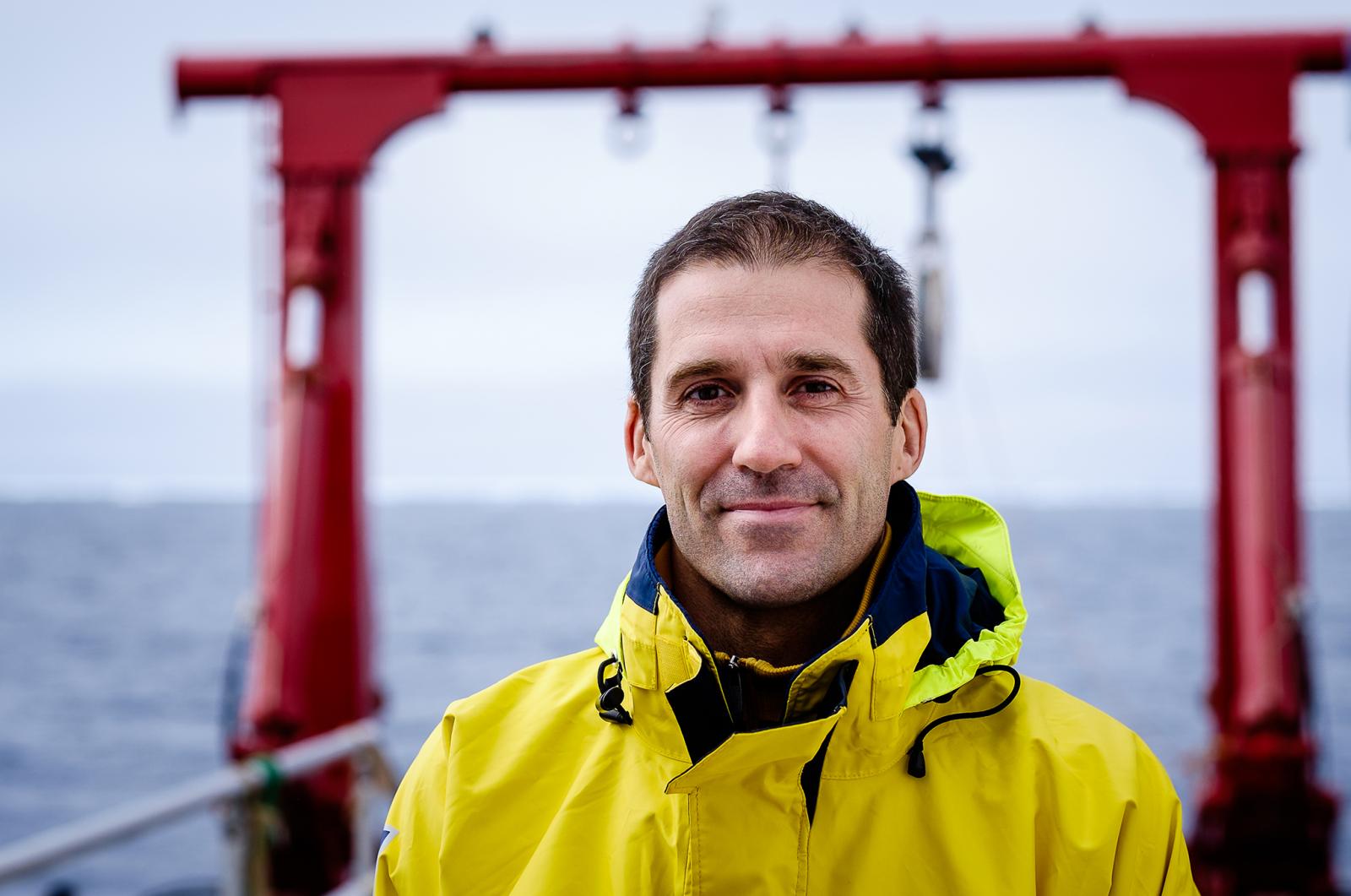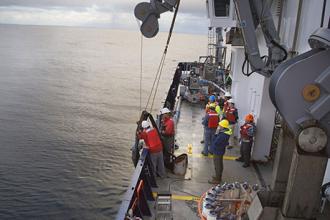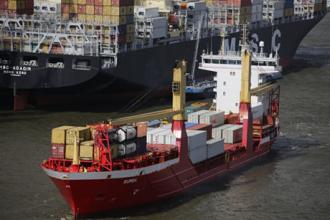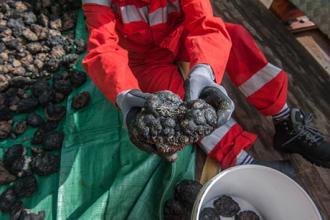
Professor
Thomas Peacock
Interests
- Deep-Sea Mining
- Environmental Fluid Dynamics
- Physical Oceanography
Professor Peacock News + Media

Mining the Deep Sea
Mining minerals found 15,000 feet below sea level could help secure a low-carbon future, but at what cost? Researchers including Thomas Peacock, professor of mechanical engineering at MIT, are racing to understand the environmental impact of deep-sea mining.

Protecting seafarers and the global supply chain during Covid-19
Professor Thomas Peacock is a member of the UN Global Compact Task Force urging coordinated international response for offshore and shipping industries.

Ocean scientists measure sediment plume stirred up by deep-sea-mining vehicle
A new field study reveals a previously unobserved fluid dynamic process that is key to assessing impact of deep-sea mining operations.
Faculty Details
Education
-
1994
UNIVERSITY OF MANCHESTER
B.Sc. -
1998
UNIVERSITY OF OXFORD
Ph.D.
Research Interests
- Deep-Sea Mining
- Environmental Fluid Dynamics
- Physical Oceanography
- Stratified flows and Internal Waves
- Ocean transport
Bio
Professor Thomas Peacock is the Director of the Environmental Dynamics Laboratory (ENDLab) in the Department of Mechanical Engineering at MIT. He received his B.Sc.(Physics) from Manchester University and D. Phil. (Physics) from Oxford University. The mission of his research group, the Environmental Dynamics Lab (ENDLab), is to advance understanding of environmental fluid dynamic phenomena to address societal grand challenges, with a committment to education and outreach to inform policy makers and the general public. His group conducts field studies, laboratory experiments and modeling of environmental flows with an emphasis on ocean dynamics and transport. He received an NSF Career Award in Physical Oceanography and has been a PI on numerous ocean field programs for NSF and ONR sponsored projects, with recent studies in the Arctic Ocean, the Timor Sea, the South Chinas Sea and the Western Pacific. In recent years, he has established a research program at MIT studying scientific and societal aspects of deep-sea mining, with activities ranging from plume dynamic studies in the Pacific Ocean to the development of an international royalty payment regime for the International Seabed Authority.
Honors + Awards
- 2022, Plenary Lecture, International Symposium on Stratified Flows
- 2021, American Physical Society (APS) Fellow
- 2014, Plenary Lecgture, APS DFD Meeting
- 2014, Editorial Board, CHAOS
- 2013, Plenary Lecture, Dynamics Days
- 2013, Plenary Lectures, Geophysical and Astrophysical Waves Meeting, Les Houches, France
- 2013, American Physical Society Gallery of Fluid Motion Prize
- 2012, Gledden Fellowship, Institute for Advanced Studies, University of Western Australia
- 2010, Plenary Lectures, Internal Waves Meeting, Corsica, France
- 2009, Plenary Lecture, CHAOS 20th Anniversary Meeting, National Academy of Sciences, Woods Hole
- 2007, Faculty Early Career Development (CAREER) Award
- 2005-2008, Atlantic Richfield CD Professorship in Energy Studies Career Development
- 1999, American Physical Society Gallery of Fluid Motion Prize
- 1996, Royal Society Physics Research in Britain Award
- 1995, Domus Scholarship (Oxford University)
- 1994, Samuel Bright Scholarship (Manchester University)
- 1993, Hatfield Scholarship (Manchester University)
Memberships
- American Physical Society
- American Geophysical Union
Professional Service
- 2023-present, International Seabed Authority, Expert scientist for committee on thresholds and standards, Scientific Expert
- 2023-2026, TRIDENT, European Deep-Sea Mining Research Program, Member of Advisory Panel
- 2020, United Nations Global Compact, Scientific Judge for International Young Researcher Competition "Reboot the Ocean", Scientific Expert
- 2020, United Nations Global Compact, Scientific Advisor for Oceans, Scientific Advisor for Oceans
- 2017-present, International Seabed Authority, Official Observer on behalf of MIT, Scientific Advisor
- 2017-2019, Workshop on Environmental Flows, Les Houches, Organizer
- 2017-2018, Workshop of Risks of Seabed Mining, MIT, Organizer
- 2017, International Seabed Authority workshop on Seabed Mining, Expert Panel Member
- 2014-2016, American Institute of Physics Journal CHAOS, Focus Issue on Objective Detection of Coherent Structures, Editor
- 2014-2015, American Physical Society Division of Fluid Dynamics Meeting, Boston, Co-Chair
- 2014, US National Congress on Theoretical and Applied Mechanics, Internal Waves Meeting, Cornell University, Member of Organizing Committee
- 2013-present, American Institute of Physics Journal CHAOS, Editor
- 2011-2013, Workshop on Uncovering Transport Barriers in Geophysical Flows, Banff International Research Station, Organizer
- 2012, Production of Morning Glory Cloud Documentary, Australia, Lead Scientist
- 2011, ONR IWISE cruise, Crew Member
- 2011, NSF EXITS cruise, Crew Member
- 2010-2011, Workshop on Coherent Structures, Lorentz Center, Ledien, The Netherlands, Co-Organizer
- 2009, Workshop on Internal Waves, Ecole de Physique des Houches, France, Co-Organizer
- 2011, European HYDRALAB Panel, Reviewer
- 2010, US National Congress on Theoretical and Applies Mechanics, Session Organizer
- 2008-2010, American Physical Society Division of Fluid Dynamics Acrivos Dissertation Committee, Member
- 2008-2010, Workshop on Coordinated Mathematical Modeling of Internal Waves workshop, Banff International Research Station, Organizer
- 2008-2010, American Institute of Physics CHAOS Focus Issue on Lagrangian Coherent Structures, Editor
- 2008, American Geophysical Union General Assembly, Session Organizer
- 2008, European HYDRALAB Panel, Reviewer
- 2008, International Conference on Theoretical and Applied Mechanics, Reviewer
- 2007-present, NSF Physical Oceanography, Dynamical Systems and Fluid Dynamics Programs, Reviewer and Panel Member
- 2007, 2009, American Physical Society Division of Fluid Dynamics, Session Chair
- 2007, ONR NLIWI cruise, Crew Member
- 2006-2007, Dynamics Days Conference, Co-Organizer
- 2006, NSF IWAP cruise, Crew Member
- 2006, US National Congress on Theoretical and Applied Mechanics, Session Organizer
- 2004-present, WHOI GFD Summer Program, Regular Participant
- 2002-present, Reviewer for Physical Review Letters, Physical Review E, Journal of Fluid Mechanics, Physics of Fluids, Experiments in Fluids, Journal of Geophysical Research, Journal of Physical Oceanography, Deep-Sea Research, Applied Physics Letters, CHAOS.
MIT Service
- 2022-2023, Martin Fellowship Evaluation Committee (Regular Member)
- 2021-present, MISTI Proposal Reviewer (Regular Member)
- 2020-2022, Hiring Committee, Mechanical Engineering search on "Computing for the health of the planet" (Regular Member)
- 2020-present, Head of Area 1 & Mechanical Engineering Council (Regular Member)
- 2018-2019, Presidential Committee on Distinguished Fellowships (Regular)
- 2017-2018, Communication Requirement, Subcommittee on the (Designated Representative, Vice Chancellor)
- 2016-2017, Freshman Advising (Regular Member)
- 2015-2016, MechE, Strategic Planning Committee (Other)
- 2014-2017, Nominations Committee, Member (Inst.)
- 2014-2016, Website Redesign, Faculty Lead (Dept.)
- 2014-2015, Area 1 Ad-hoc Committee Member (Dept.)
- 2013-2019, Media Activities, Media Moghul (Dept.)
- 2013-2018, Presidential Committee on Distinguished Fellowships (Regular)
- 2013-2014, Freshman advisor (Inst.)
- 2013-present, Distinguished Scholarships Committee, Member (Inst.)
- 2012-present, ECM Nexus, Lab Manager (Dept.)
- 2011-2012, ECM Nexus Renovation, Faculty Lead (Dept.)
- 2011, Ocean Engineering Hiring Committee, Member (Dept.)
- 2009-present, MISTI Program, Faculty Reviewer (Inst.)
- 2008-2011, Graduate Admissions, Member (Dept.)
- 2007, MIT SEPT Summer Program, Faculty Lead (Inst.)
- 2006-present, MIT-France Exchange Program Coordinator (Dept.)
- 2006-2011, Pi Tau Sigma, Faculty Representative (Dept.)
- 2005-2011, MMEC Seminar Organizer (Dept.)
- 2005-2010, IAP Program Coordinator (Dept.)
- 2004-2005, Graduate Committee, Member (Dept.)
- 2003, Health & Safety Officer (Dept.)
- 2001-2003, Brown Bag Seminar Organizer (Dept.)
Teaching
- Fluid Dynamics (1.63)
- Engineering Mathematics: Linear Algebra and ODEs (2.087)
- Nonlinear Dynamics I: CHAOS (2.050)
- Nonlinear Dynamics II: Continuum Mechanics (18.354)
- Dynamics and Control I (2.003)
- Dynamics I (2.03)
- Dynamics II (2.031)
- Measurement and Instrumentation (2.671)
- Advanced Fluid Dynamics (2.26)
Publications
- Peacock, T. and Ouillon, R., “The fluid mechanics of deep-sea mining,” Annual Review of Fluid Mechanics, 55, 403-430 (2023).
- Boury, S., Maurer, P., Joubaud, S., Peacock, T., and Odier, P., “Triadic resonant instability in confined and unconfined axisymmetric geometries,” Journal of Fluid Mechanics, 957, A20 (2023).
- Munoz-Royo, C.,..., and Peacock, T., “An in situ study of abyssal turbidity-current sediment plumes generated by a deep seabed polymetallic nodule mining preprototype collector vehicle,” Science Advances, 8 (38), (2022).
- Ouillon, R., ..., and Peacock, T., “Advection-diffusion-settling of deep-sea mining sediment plumes. Part 2: Collector plumes,” FLOW, 2, E23 (2022).
- Ouillon, R., ..., and Peacock, T., “Advection-diffusion-settling of deep-sea mining sediment plumes. Part 1: Midwater plumes,” FLOW, 2, E22 (2022).
- Fine, E.C., ..., and Peacock, T., “Double diffusion, shear instabilities, and heat impacts of a Pacific Summer Water intrusion in the Beaufort Sea,” Journal of Physical Oceanography, 52 (2), 189-203 (2022).
- Munoz-Royo, C., Peacock, T., et al., “Extent of impact of deep-sea nodule mining midwater plumes is influenced by sediment loading, turbulence and thresholds,” Nature Communications Earth & Environment, 2, 148 (2021).
- Ouillon, R., Kakoutas, C., Meiburg, E. and Peacock, T., “Gravity currents from moving sources,” Journal of Fluid Mechanics, 924, A43 (2021).
- MacKinnon, J., Simmons, H., Hargrove, J., Thomson, J., Peacock, T. et al., “A warm jet in a cold ocean,” Nature Communications, 12, 2418 (2021).
- Dauxois, T., Peacock, T., Bauer, P., Caulfield, C. P., Cenedese, C., Gorle, C., Haller, G., Ivey, G. N., Linden, P. F., Meiburg, E., Pinardi, N., Sepp Neves, A. A., Vriend, N. M. and Woods, A., “Confronting grand challenges in environmental fluid dynamics,” Physical Review Fluids, 6, 02051 (2021).
- Wang, D., Adams, E.E., Munoz-Royo, C., Peacock, T. and Alford, M.R., “Effect of crossflow on trapping depths of particle plumes: laboratory experiments and application to the PLUMEX field experiment,” Environmental Fluid Mechanics, 21, 741-757 (2021).
- Jeon, C., Park, J.H., ..., and Peacock,T., “Advanced remote data acquisition using a pop-up-data shuttle (PDS) to report data from current- and pressure-recording inverted echo sounders (CPIES),” Frontiers in Marine Science, 8, 928 (2021).
- Rypina, I.I., Kirincich, A. and Peacock, T.,“Horizontal and vertical spreading of dye in the coastal ocean of the northern Mid-Atlantic bight,” Continental Shelf Research, 230, 104567 (2021).
- Filippi, M., Hanlon, R., Rypina, I.I., Hodges, B.A., Peacock, T. and Schmale III, D.G., “Tracking a surrogate hazardous agent (Rhodamine dye) in a coastal ocean environment using in-situ mea- surements and concentration estimates derived from drone images,” Remote Sensing, 13 (21), 4415 (2021).
- Filippi, M., Hadgighesam, A., ... and Peacock, T., “Investigating transport in a tidally driven coral reef atoll flow using Lagrangian coherent structures,” Limnology & Oceanography, 66 (11), 4017-4027 (2021).
- Boury, S., Odier, P. and Peacock, T., “Experimental generation of axisymmetric internal wave super-harmonics,” Physical Review Fluids, 6, 064801 (2021).
- Filippi, M., Rypina, I.I., Hadjighesam, A. and Peacock, T., “An optimized-parameter spectral clustering approach to coherent structures detection in geophysical flows,” Fluids, 6 (1), 39 (2021).
- Filippi, M., Rypina, I., Hadjighasem, A., and Peacock, T., “An Optimized-Parameter Spectral Clustering Approach to Coherent Structure Detection in Geophysical Flows,” Fluids, 6(1), 39 (2021).
- Drazen, J. C., Smith, C. R., Gjerde, K. M., Haddock, S. H. D., Carter, G., Choy, C. A., Clark, M., Dutrieux, P., Goetze, E., Hauton, C., Hatta, M., Koslow, J. A., Leitner, A., Pacini, A., Perelman, J. N., Peacock, T., Sutton, T., Watling, L. and Yamamoto, H., “Consideration of midwater ecosystems is required to fully evaluate the environmental risks of deep-sea mining,” Proceedings of the National Academy of Sciences, 117(30), 17455-17460 (2020).
- Serra, M., Sathe, P., Rypina, I., Kirincich, A., Lermusiaux, P., Allen, A., Peacock, T. and Haller, G., “Search and rescue at sea aided by hidden flow structures,” Nature Communications, 11, 2525 (2020).
- Leclair, M., Lowe, R., Zhang, Z., Ivey, G.R. and Peacock,T., “Uncovering Fine-Scale Wave-Driven Transport Features in a Fringing Coral Reef System via Lagrangian Coherent Structures,” Fluids, 5(4), 190 (2020).
- Andres, M., Musgrave, R., Rudnick, D. L., Zeiden, K., Peacock, T. and Park, J. H., “On the predictability of sea surface height around Palau,” Journal of Physical Oceanography, 50(11), 3267- 3294 (2020).
- Boury, S., Pickart, R. S., Odier, P., Lin, P., Li, M., Fine, E. C., Simmons, H. L., MacKinnon, J. A. and Peacock, T., “Whither the the Chukchi Slope Current?,” Journal of Physical Oceanography, 50(6), 1717-1732 (2020).
- Filippi,M.,Budisic,M.,Allshouse,M.R.,Atis,S.,Thiffeault,J.L.andPeacock,T.,“Usingbraids to quantify interface growth and coherence in a rotor oscillator flow,” Physical Review Fluids, 5(5), 054504 (2020).
- Boury, S., Odier, P. and Peacock. T., “Axisymmetric internal wave transmission and resonant interference in nonlinear stratifications,” Journal of Fluid Mechanics, 886, 8 (2020).
- Supekar, R. and Peacock, T., “Interference and transmission of spatiotemporally locally forced internal waves in non-uniform stratifications,” Journal of Fluid Mechanics 866, 350-368 (2019).
- Boury, S., Peacock, T. and Odier, P., “Excitation and resonant enhancement of internal wave modes,” Physical Review Fluids 4, 034802 (2019).
- Rzeznik, A., Flierl, G. and Peacock, T. “Model investigations of dewatering plumes generated by deep-sea mining nodule operations,” Ocean Engineering, 172, 684-696 (2019)
- Peacock, T. and Alford, M.A., “Is deep-sea mining worth it?” Scientific American, 318 (5), 72-77 (2018).
- Musgrave, R., Flierl, G and Peacock, T., “The generation of Rossby waves and wake eddies by small islands,” Journal of Marine Research, 76, 63-91 (2018).
- Coulin, J., Haley Jr., P.J., Jana, S., Kulkarni, C.S., Lermusiaux, P.F.J and Peacock, T., “Environmental and Ocean Plume Modeling for Deep Sea Mining in the Bismarck Sea,” Oceans ’17 MTS/IEEE (2017).
- Allshouse M.R. and Peacock T., "Lagrangian based methods for coherent structure detection," Chaos, 25, 097617 (2015).
- Allshouse M.R. and Peacock T., "Refining finite-time Lyapunov exponent ridges and the challenges of classifying them," Chaos, 25, 087410 (2015).
- Alford, M., Peacock, T. et al, "The formation and fate of internal waves in the South China Sea," Nature, 521, 65-69 (4 pages), 2015.
- Ouazzani, Z., Hacker, J., Thompson, R. and Peacock T., "The Morning Glory Cloud: flow visualization by Mother Nature," Physics of Fluids, 26, 091110 (1 page), 2014.
- Mercier M., Doyle B., Ardekani A.M. and Peacock T., "Self-propulsion of immersed objects via natural convection," Physical Review Letters, 112, 204501 (5 pages), 2014.
- Mathur M., Carter G. and Peacock T., "Topographic scattering of the low-mode internal tide in the deep ocean," Journal of Geophysical Research: Oceans, 119, 2165-2182 (18 pages), 2014.
- Sutherland, B.R., Dauxois, T. and Peacock, T., “Internal Waves in Laboratory Experiments,” chapter 10, 193-212 (20 pages), Modeling Atmospheric and Oceanic Fluid Flows: Insights from Laboratory Experiments, AGU, 2014.
- Mercier, M. Gostiaux, L., Helfrich, K., Sommeria, J., Viboud, S., Didelle, H., Ghaemsaidi, S.J., Dauxois, T. and Peacock T., “Large-scale realistic modeling of M2 internal tide generation at the Luzon Strait,” Geophysical Research Letters, 40, 5704-5708 (5 pages), 2013.
- Ghamesaidi, S.J. and Peacock. T., “3D Stereoscopic PIV visualization of the axisymmetric conical internal wave field generated by an oscillating sphere,” Experiments in Fluids, 54, 1454-1461 (8 pages), 2013.
- Peacock, T. and Haller, G., “Lagrangian Coherent Structures: the hidden skeleton of fluid flows,” Physics Today, 66, 41-44 (4 pages), 2013. Also reproduced in French, in the journal Pour La Science, the French equivalent of Scientific American, and Japanese.
- Peacock, T., “Laboratory experimental methods,” chapter 32, 457-466 (10 pages), The Handbook of Environmental Fluid Mechanics (Ed. H.J.S. Fernando), Taylor & Francis, 2012.
- Echeverri, P., Yokossi, T., Balmforth, N.J. and Peacock, T., “Tidally generated internal wave attractors between double ridges,” Journal of Fluid Mechanics, 669, 354-374 (21 pages), 2011.
- Echeverrri, P. and Peacock, T., “Internal tide generation by arbitrary two-dimensional topography,” Journal of Fluid Mechanics, 659, 247-271 (25 pages), 2010.
- Mercier, M.J., Martinand, D., Mathur, M., Gostiaux, L., Peacock, T. and Dauxois, T., “New wave generation,” Journal of Fluid Mechanics, 657, 308-334 (27 pages), 2010.
- Allshouse, M.R., Barad, M.F. and Peacock, T., “Propulsion generated by diffusion-driven flow,” Nature Physics, 6, 516-519 (4 pages), 2010.
- Mathur, M. and Peacock, T., “Internal wave interferometry,” Physical Review Letters, 104, 118501 (4 pages), 2010.
- Peacock, T. and Dabiri, J., “Introduction to Focus Issue: Lagrangian coherent structures,” CHAOS, 20, 017501 (3 pages), 2010.
- Tang, W.E. and Peacock, T., “Lagrangian coherent structures and internal wave attractors,” CHAOS, 20, 017508 (9 pages), 2010.
- Peacock, T., Mercier, M.J., Didelle, H., Viboud, S. and Dauxois, T., “A laboratory study of low-mode internal tide scattering by finite-amplitude topography,” Physics of Fluids, 21, 121702 (4 pages), 2010.
- Mathur, M. and Peacock, T., “Internal wave beam propagation in nonuniform stratifications,” Journal of Fluid Mechanics, 639, 133-152 (20 pages), 2009.
- Echeverri, P., Flynn, M.R., Winters, K.B. and Peacock, T., “Low-mode internal tide generation by topography: an experimental and numerical investigation,” Journal of Fluid Mechanics, 636, 91-108 (18 pages), 2009.
- Balmforth, N.J. and Peacock, T., “Tidal conversion by supercritical topography,” Journal of Physical Oceanography, 39, 1965-1974 (10 pages), 2009.
- Yick, K.Y., Torres, C.R., Peacock, T. and Stocker, R., “Enhanced drag of a sphere settling in a stratified fluid at small Reynolds number,” Journal of Fluid Mechanics, 632, 49-68 (20 pages), 2009.
- Weldon, M., Peacock, T., Jacobs, G.B., Helu, M. and Haller, G., “Experimental and numerical investigation of the kinematic theory of unsteady separation,” Journal of Fluid Mechanics, 611, 1-11 (11 pages), 2008.
- Blanchette, F., Peacock, T. and Cousin, R., “Stability of a stratified fluid with a vertically moving sidewall,” Journal of Fluid Mechanics, 609, 305-317 (13 pages), 2008.
- Peacock, T. and Bradley, E., “Going with (or against) the flow,” Science, 320 (5881), 1302-1303 (2 pages), 2008.
- Peacock, T., Echeverri, P. and Balmforth, N.J., “Experimental investigation of internal tide generation by two-dimensional topography,” Journal of Physical Oceanography, 38 (1), 235-242 (8 pages), 2008.
- Alford, M.H., MacKinnon, J.A., Zhao, Z., Pinkel, R., Klymak, J. and Peacock, T., “Internal waves across the Pacific,” Geophysical Research Letters 34 (24), L24601 (6 pages), 2007.
- Mathur, M., Haller, G., Peacock, T., Ruppert-Felsot, J.E. and Swinney, H.L., “Uncovering the Lagrangian skeleton of turbulence,” Physical Review Letters, 98 (14), Art. No. 144502 (4 pages), 2007.
- Yick, K.Y., Stocker, R. and Peacock, T., “Microscale Synthetic Schlieren,” Experiments in Fluids, 42 (1), 41-48 (8 pages), 2007.
- Heitz, R., Peacock, T. and Stocker, R., “Optimizing diffusion-driven flow in a fissure,” Physics of Fluids, 17, Art. No. 128104 (3 pages), 2005.
- Peacock, T. and Tabaei, A., “Visualization of nonlinear effects in internal wave beam reflection,” Physics of Fluids, 17, Art. No. 061702 (4 pages), 2005.
- Peacock, T., and Weidman, P., “The effect of rotation on conical wave beams in a stratified fluid,” Experiments in Fluids, 39, 32-37 (6 pages), 2005.
- Peacock, T., Blanchette, F. and Bush, J.W.M., "The stratified Boycott effect," Journal of Fluid Mechanics, 529, 33-49 (17 pages), 2005.
- Peacock, T., Stocker, R. and Aristoff, J., “An experimental investigation of the angular dependence of diffusion-driven flow,” Physics of Fluids, 16, 3503-3505 (3 pages), 2004.
- Peacock, T., Bradley, E., Hertzberg, J. and Lee, Y.C., “Forcing a planar jet flow using MEMS,” Experiments in Fluids, 37, 22-28 (7 pages), 2004.
- Blanchette, F., Peacock, T. and Bush J.W.M., “The Boycott effect in magma chambers,” Geophysical Research Letters, 31, L05611 (4 pages), 2004.
- Ma, Z.C., Bradley, E., Peacock, T., Hertzberg, J.R. and Lee, Y.C., “Solder assembled large MEMS flaps for fluid mixing,” IEEE Transactions on Advanced Packaging, 26 (3), 268-276 (9 pages), 2003.
- Peacock, T. and Mullin, T., “Homoclinic bifurcations in a liquid crystal flow,” Journal of Fluid Mechanics, 432, 369-386 (18 pages), 2000.
- Peacock, T. and Mullin T., “The transition to turbulence in a microscopic fluid flow,” Physics of Fluids, 12, S8 (1 page), 2000.
- Mullin, T., Juel, A. and Peacock, T., “Silnikov chaos in fluid flows,” chapter 2, 24-43 (20 pages), New Concepts in Turbulence (Ed. C.Vassilicos), Cambridge University Press, 2000.
- Mullin, T. and Peacock, T., “Hydrodynamic instabilities in nematic liquid crystals under oscillatory shear,” Proceedings of the Royal Society of London A, 455, 2635-2653 (19 pages), 1999.
- Peacock, T., Binks, D.J. and Mullin, T., “From low- to high-dimensional dynamics in a microscopic fluid flow,” Physical Review Letters, 82, 1446-1449 (4 pages), 1999.
- Peacock, T., Mullin, T. and Binks, D.J., “Bifurcation phenomena in flows in a nematic liquid crystal,” International Journal of Bifurcations and Chaos, 9, 427-441 (15 pages), 1999.